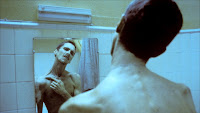A silly amount of time spent trying to size three hyperlinked images of the same dimensions into a mosaic collage that would fit the width of a blog post; that's easy for me to say, easy enough until I added in consistent spacing between the images. I cheated; I hard-coded the sizes and the two smaller images were stretched slightly, but I think with a proper use of divs acting as columns, 100% widths and the overflow property, it should be possible to write something slightly more dynamic. Only, not today; I’m chewing up too many evenings working on minor side-projects that can be filed under “how” rather than “where”; not always a bad thing, I’m sure I’ll find a suitable use for “where” at some point.
In the 1,056th redesign of this blog the search box has a (CSS3) transition in width, which looks good where supported (Chrome, Firefox etc) and jerky where not (IE). It’s a bit of a gimmick either way since it requires screen real-estate to expand into; perhaps this is the reason Twitter recently changed their search box to fixed width? On the other hand, the on-focus transition in background colour looks good and has an acceptable degradation on IE. But let’s face it, who uses the search box on a blog? I might occasionally search within a niche blog but mostly I rely on
The Google; why restrict myself to one source when I can search them all? And I have no niche, no idea from one week to the next what I might write about, so it’s even more difficult to imagine a reader having read a post on
minimum priced alcohol, then wondering what I have to say on that masterpiece of modern cinema,
Shoot 'Em Up. I love a good film...
I love a good film... and Shoot 'Em Up isn’t one of them. Yet despite this love of film, I’ve been thinking of cancelling my Lovefilm subscription. I’ve signed up to Netflix, using the free trial to watch season five of The Office, but there’s enough to keep me interested, for a few months at least. The picture quality - through the Wii - is adequate, not as good as that provided by BT Vision; use the iPlayer on both devices and the Wii appears a little fuzzy in comparison. Netflix does however have an easy interface; I’m not keen on the large sideways scrolling tiles, but there are other views and I like features such as automatically lining up the next episode in a series. It’s the convenience of streaming versus the better picture and newer releases afforded by DVD. Only my last three rentals on Lovefilm have been a mixed bag.
Rise of the Planet of the Apes was as good as I’d heard but
Captain America hugely disappointing, and
Bad Teacher so bad I’d almost call it evil; I got what I deserved. Not like
In the Mood for Love, my first film on Netflix, moving and understated, it suffered an unscheduled pause an hour into the film and - entirely unrelated - from a cruel suspicion the subtitle font was in
Comic Sans; it wasn’t, but it was close. I mean, what kind of person notices things like that?














